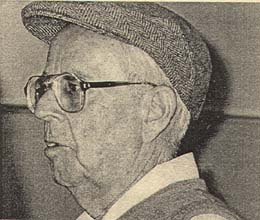Stan Stapp (1918-2006) was the longtime publisher of the North Central Outlook, one of Seattle's most respected and influential community newspapers, and a mentor to two generations of "underground" and "alternative" journalists. He died on May 5 at age 88. Walt Crowley delivered this remembrance at University Unitarian Church on May 21, 2006.
Eulogy by Walt Crowley
Last week, Stanley Kunitz, one of America’s great poets passed away. It is conceivable that he and Stan Stapp crossed paths during Kunitz’s brief tenure as a visiting professor at the University of Washington nearly half a century ago, a time when Theodore Roethke ruled the local literary roost and the back room at the Blue Moon.
In his justly famous poem "Passing Through," Kunitz wrote:
Maybe I enjoy not-being as much
as being who I am. Maybe
it's time for me to practice
growing old. The way I look
at it, I'm passing through a phase:
gradually I'm changing to a word.
Whatever you choose to claim
of me is always yours:
nothing is truly mine
except my name. I only
borrowed this dust.
Meditating on this sentiment, I wondered what we should claim of Stan. Beyond his name, what word would sum up his life and his meaning to us. Stan would recognize the challenge, finding that word or phrase that reduces a person’s career or community standing to a telegraphic appositive. You see these little taglines bracketed by commas in the press all the time: Mr. Jones, corporate executive, or Mrs. Smith, community activist.
In journalese, they’re called -- rather ominously -- “tombstones.”
What tombstone do we pick for Stan?
Journalist is the most obvious, and an appellation that anyone standing left of Fox News -- and I don’t think they really count -- should be proud to claim. Stan’s decades of work publishing and editing the North Central Outlook stand as a monument to the power of the press not just to inform and educate, but to motivate, inspire, and unite. The Outlook was part of the glue that held its community together. Whether offering its wry take on the week’s North Precinct police blotter -- “Hash Ground Fresh Weekly” -- or in-depth coverage of complex social and political issues, the Outlook not only provided information and perspective, it encouraged and reinforced our sense of belonging to a community of caring and intelligent neighbors, and to an historical continuity spanning decades, for Stan was a living repository of Seattle history.
Foremost, the Outlook never left you despairing. It gave you hope that needs could be met, problems could be solved, differences could be bridged. It gave you hope against all contrary evidence, that democracy could work at least locally.
Another obvious “tombstone” for Stan is teacher, or perhaps more broadly, mentor. That is how I knew him, when in 1967 he appeared one day in the office of the Helix to offer the Outlook’s assistance in setting type for the newspaper. “Setting type” was a completely novel concept for us -- a band of scraggly hippies, lefties, and cultural revolutionaries led by Paul Dorpat. None of us had any idea how to put out a newspaper -- indeed the Helix was supposed to be a one-edition wonder -- which is why, I think, the paper had such an impact.
Both the Outlook and the Helix were the beneficiaries of a technological revolution called photo-offset printing. This process eliminated the rigid columns and grids mandated by cases and cast-metal type. It let the designer and compositor cut nearly unlimited freedom to create virtually anything they wanted within the frame of the printed page, so long as it could be photographed and reduced to black and white or CBYM.
But there were some basic rules that had to be observed -- like readable type. Stan invited us into the basement of his family’s rambling Wallingford Craftsman, where the Outlook was produced, and taught us how to use his new IBM typesetting computers, which were the most advance available in the city. They were light years ahead of the dailies, which were still composed on clattering, quaintly maniacal linotype machines.
This started as a “business arrangement.” We were supposed to compensate the Outlook for its services and machines. Somehow we forgot to pay, or maybe Stan forgot to bill us. Regardless, when he upgraded the Outlook’s computers, the “obsolete” models ended up in the Helix office. I don’t recall there being a charge for that either.
The Helix published its last issue in June 1970, but under Stan, the Outlook continued to serve as a nursery for other community and “alternative” newspapers. Even after he sold the Outlook in 1974, he continued to midwife new journalistic enterprises with his sage advice and donated services.
There is another word we might apply to Stan, though it is currently much maligned; that word is “liberal.” Spell it with lowercase “l” or a capital “L” as you prefer. Stan’s liberalism began with his spirit -- his humanity and humor, his curiosity and tolerance, his generosity and acceptance. This translated inevitably and naturally into political stances -- an abhorrence of violence and war, of discrimination and injustice, of the arrogance of power and the exploitation of the powerless -- but it also buttressed a faith that human beings can work together as citizens to improve the neighborhood, the nation, and the world.
So those are, I submit three good words for Stan: journalist, mentor, and liberal. Not a bad set of “tombstones.”
As the poet reminds us, when all is said and done and the mortal remains are laid to rest, Stan Stapp is left only his name, and we only our memories of him.
But even if you never met him or knew of his existence, I would argue that he survives in his effect upon our community and city.
Yes, we all borrow this dust, but some return it better than they found it.

